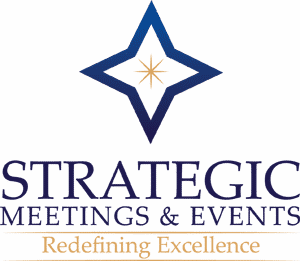Strategic Event Planning Takes Flight
By Christy Lamagna, CMP, CMM, CTSM
What if I told you I wanted to personally orchestrate the end of the meeting and strategic event planning profession as we know it today? Not only that, but I bet that by the time you have finished reading this blog, you are going to not just agree with me but you’re going to join me in my quest.
Let’s start with some basic facts you may not know about our industry:
Meeting Planner’s International cites the Economic Impact of meetings on our economy as:
- Approximately 1.8 million meetings and events occur in the U.S. each year, resulting direct contributions to the economy including:
- $280 billion in spending
- $115 billion contribution to GDP
- $14.8 billion federal tax revenue
- $13.2 billion state and local tax revenue
- $66.8 billion in labor income
- Meetings and events contribute more to the GDP than the air transportation, motion picture, sound recording, performing arts and the spectator sport industries.
- Combined direct, indirect and induced effects of the meeting industry to GDP totals $393 billion.

With these statistics from five years ago, touting those very notable results, imagine if we could find a report with today’s statistics? (It’s curious that there doesn’t seem to be one out there.) Either way, the figures are impressive. Why then, are we the people who drive all that economic wealth often undervalued?
There is a nearly universal misinterpretation of why meetings are held, the value they can bring, and what meeting professionals do. As a result, both the public at large and our employers undervalue the vast array of talents and value we provide.
-
You consider yourself a/an
- A. Event planner
- B. Meeting planner
- C. Event marketer
- D. Party planner
- E. Call me whatever you like; I do it all
-
You are talking to someone you just met who asks you what you do for a living. When you tell them you plan events they say:
- A. OOOH, you are SO lucky you get to plan parties for a living!
- B. Would you pack me in your suitcase and take me with you on your next trip?
- C. That sounds like so much fun!
- D. I have a friend/colleague/relative who wants to be a planner. Can he/she call you?
- E. All of the above
-
The last time you asked your boss for additional headcount:
- A. You were told it wasn’t in the budget
- B. You did the work yourself while you waited for a reply that either never came or was a ‘no’
- C. You were told you could have a few hours of an admin’s time each week instead
- D. You realized even if you could hire someone you don’t have time to train them
- E. All of the above
-
When you think about your career which of the following are true:
- A. I am highly respected by my peers, management team and colleagues
- B. I am an integral part of all decisions effecting events and event marketing
- C. My time is valued and people I work with and support understand what it takes to do my job
- D. I am regarded as a trained professional whose skills are an essential part of the organization’s success
- E. None of the above
 My bet you answered “E” to every question. How is it that we, who power the industry that contributes $393 billion to the economy each year are often undervalued, underutilized and not considered integral parts of an organization’s executive team? Before you blame your boss, you need to realize that you may unknowingly be a part of the problem.
My bet you answered “E” to every question. How is it that we, who power the industry that contributes $393 billion to the economy each year are often undervalued, underutilized and not considered integral parts of an organization’s executive team? Before you blame your boss, you need to realize that you may unknowingly be a part of the problem.
Consider this: when the air travel industry began, stewardesses staffed the cabins. The catchphrase, ‘Coffee, Tea or Me?’ was the unofficial tagline for the beautiful ‘’sky waitresses” who had to be single, fall into a particular weight and height category and who flirted with passengers as a required part of their job. Today, flight attendants dress professionally, keep a watchful eye over the cabin and are trained and ready to assist in case of an emergency. They changed as an industry, setting new work standards, creating a new work environment and in turn earned respect from their employers and passengers. They changed the course of their career path as they knew they had much more to offer than was being acknowledged.
Event professionals are the modern-day equivalent of stewardesses. We allow ourselves to be viewed merely at a surface level. We credit for the myriad of skills required to do our jobs successfully, as an industry we don’t have a cohesive message or mission statement. The one thing we have failed to plan is our career trajectory as a whole.
I’d like to fix that and I have a plan. It requires us to come together, define our common goal, create a shared vocabulary, standards of excellence and a tools to clearly measure and prove our worth. In order for the profession to not just evolve, but survive, we must become ‘Event Strategists’ and plan according to the principles that define and drive strategic events.
As ‘Event Strategists,’ our mission will be to create goal-oriented events in alignment with an organization’s sales and marketing goals. There is a defined process on how this is done and how results are measured. In the world of Strategic Event Planning the concept of having anyone but a trained, qualified, certified professional produce events will be akin to having your hairdresser perform your root canal; it is not about making something look pretty. You need a skilled professional to do the job correctly.
You can start making a difference today by incorporating the below into your work day. Each is the topic for a future posting that will dive deeper into each point.
- Always start with the end in mind; what is your goal? If you don’t know, you aren’t ready to begin
- Remember that it isn’t about you; that applies to menu choices, giveaways, destinations; all event related decisions need objective eyes on them
- You have to answer the critical question of, ‘What’s in it for me’ to inspire anyone to do anything; especially attend an event that is not an internal audience.
I have a comprehensive game plan to share and am literally writing the textbook on how we can make this happen. (I am not trying to sell books; this isn’t about me.) If you want to add your voice and help start making the change we need to create, continue the conversation by emailing me at christy.lamagna@strategic.events or follow me @SMEChristy.
For more tips, connect with us on Twitter @socialtables and on Facebook.
Tags: Strategic Event Planning Takes Flight, Strategic Event Planning, Strategic Planners, Event Planning, Event Planners, Event Strategist, Strategic Events, Corporate Meetings, Corporate Events, Strategic Event Planning, Event Planning Profession, Strategic Event Planning Profession, Social Tables





